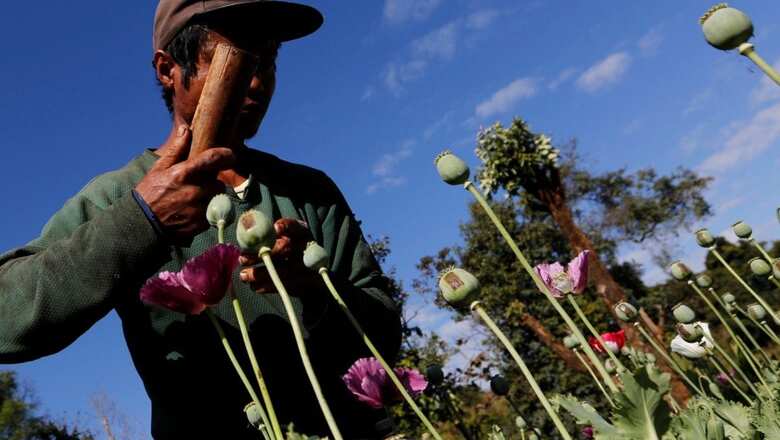
views
In a major development, Myanmar has overtaken Afghanistan to become the world’s largest source of opium. The decades-long uninterrupted reign of Afghanistan as the world’s largest supplier of opium has been disrupted by Myanmar. UNODC Bangkok office, on December 18, 2023, disclosed that opium cultivation areas expanded most in Myanmar’s border regions in northern Shan state, followed by Chin and Kachin states, as yield expanded by 16 per cent to 22.9 kilogrammes per hectare because of sophisticated farming practices.
Myanmar farmers now earn about 75 per cent more from Opium poppy farming, as average prices of the flower have reached about $355 per kilogram and the cultivation area has increased by 18 per cent year on year, from 40,100 to 47,000 hectares, boosting the potential yield to its highest level since 2001.
For India, this development should ring an ominous bell. When Afghanistan dominated opium production, despite the presence of a buffer territory like Pakistan, India’s Western land borders and maritime borders witnessed a continual bombardment of opium and other narcotic concoctions by every conceivable mode of transportation, from ships to drones. Narco-terrorism remains a big challenge on the Western borders for the defence forces, para-military forces and every enforcement agency. The sudden emergence of Myanmar in northeast India’s land borders, as the world’s largest source of opium, is being felt in the ongoing Manipur tribal drug wars.
The Golden Triangle has been in existence simultaneously with the Golden Crescent for several decades, and India was being inundated by opium from both sides, but the alter ego of the narcotics trade is narco-terrorism. India bore a great impact of the drug trade and narco-terrorism on the Western sector, which is directed and controlled even today by Islamabad. The Afghan-Pakistan drug trade is in the firm grip of Islamic fundamentalists and a wide variety of terror organisations, actively supported and trained by the ISI of Pakistan. Despite decades of unabated and concentrated military efforts by the Americans and to a limited extent by the Russians, no serious disruption occurred for the opium production and distribution across the globe, from Afghanistan. The present estimated 95 per cent decline in opium cultivation in Afghanistan after a drug ban by the Taliban in 2022 is seen as the reason for the global opium supply chain getting shifted to Myanmar.
For decades, northern Thailand in the Golden Triangle, with Laos and Myanmar sharing the Mekong River, has been one of the biggest drug trafficking corridors in the world. In Shan state, Myanmar, there is not only the major production of heroin and opium, but also that of synthetic drugs like methamphetamine which feeds the whole of the Asia-Pacific region, stretching from Japan all the way down to New Zealand.
Unlike in Afghanistan, there are complex internal governance issues inside Myanmar, with a lot of vicious drug gangs, not terrorists, controlling different territories. Drug production is happening in very remote areas and is supervised, monitored, controlled, and trafficked to every neighbouring country, even India. Drug trafficking also comes with a package of assorted organised crimes like money laundering, trafficking in wildlife products, arms, and human trafficking, especially in women and children. Such criminal activities also need strong political support which is granted only for an inexhaustible supply of liquid cash or gold.
The Rohingya refugee problem is another offshoot of the drug trade. The Rohingyas, who are a fierce Muslim ethnic minority group in Myanmar, are not recognised as an official ethnic group and have been denied citizenship since 1982 by the majority Buddhist rulers of Myanmar, making them the world’s largest stateless population. Fleeing from sexual and gender-based violence (SGBV) and abuse, these refugees, infiltrating into India and Bangladesh, have also been utilised as drug carriers, especially for Methamphetamines, and the crazy drug Yaba. Bangladesh is inundated with Yaba, and the estimated consumption is an average of a mind-boggling two million pills a day! In Myanmar, most of the Yaba production labs are in Shan state along the border with China, which is controlled by the United Wa State Army (UWSA), a rebel group, and also the Rohingya territory of Rakhine state and Sagaing division, where a similar item called the “World Is Yours” is also produced.
India’s Northeast is identified as an active corridor linking Myanmar and Bangladesh. One route passes through Manipur, which is contiguous to Myanmar’s Sagaing division. Another route lies through Mizoram, originating at Champhai, which leads to different locations on the India-Bangladesh border. India’s long, porous land border, measuring 1,643 kilometres with Myanmar as also the 4,096-kilometre-long international border, between India and Bangladesh which is the fifth-longest land border in the world, is all set to see a massive surge in drug-trafficking of all kinds.
The Shan state in Myanmar will soon become the Kandahar of the East. ISI of Pakistan has already geared itself to create disturbances in the Northeast, by linking with the Arakan Rohingya Salvation Army (ARSA), whose chieftain is Ataullah Abu Ammar Jununi. He was born in Karachi to a migrant family, which had fled from Rakhine state in Myanmar sometime in the 1960s. It is estimated that the ARSA has over 2,000 Rohingyas as well as approximately 150 females.
While a section of the Rohingyas has been trained by the Pakistani spy agency ISI within the mountainous areas in Nepal, funding has been coming from several countries including Turkey, Iran, and Qatar. It is reported that preparations are underway for taking total control over the Cox Bazar district in Bangladesh and finally proclaiming it as an ARSA Caliphate. ARSA has taken over control of trafficking in Yaba pills and has been trafficking consignments of this drug to Bangladesh, Thailand, India, Philippines, Japan, and South Korea, as well as Lebanese Hezbollah and Palestinian Hamas. Generally, the consignments of Yaba pills are sent from Myanmar through various shipping lines in concealed consignments to the United Arab Emirates and Lebanon, where these are later re-routed to Middle Eastern nations, especially Saudi Arabia. The multi-billion-dollar drug trade will receive an added impetus with the present boom in opium production in Myanmar.
India is all set to face major challenges in the Northeast. This writer would suggest that the Government of India should set up a multi-disciplinary joint force of all para-military forces and enforcement agencies, under a Central Narcotics Interdiction Command (CNIC), based at Guwahati, and not delegate the work to the State agencies as most are lacking funds, training, and competence. A single NDPS Court for the entire region is a dire necessity as judicial officers and prosecutors need to know about the nuances of the aggravating complex drug problem, as also the critical legal intricacies of the NDPS Act.
A cadre of Village Security Units along the international borders needs to be raised to assist the security agencies. On the international borders, assistance can be sought from UNODC which has set up Border Liaison Offices or BLOs under its border management programme. There are 120 BLOs from Myanmar in the west, to China in the east, and Indonesia to the south as well as Thailand, Laos, Cambodia, and Vietnam. They enable countries in the region to work more effectively to combat illegal trafficking as they can quickly share information and act together. India and Bangladesh need to join this network.
Sergio Troncoso, in his book ‘Our Lost Border: Essays on Life amid the Narco-Violence’ writes, “So the Juárez/El Paso area before the recent drug violence was not a bilingual, bi-national, bicultural Zion, but it was one world. One entity. One place. One city where you could live in between worlds and have the hope of creating something new. A third way to be, not along the border, but on the border.
That is what the violence has destroyed, that unity, however tenuous it ever was. It has destroyed the idea of that unity and the reality of living so uniquely astride an international border. This ‘real idea’ was always a work-in-progress, and for the moment it is lost. Yet that real idea of unity had great value.”
The writer is a retired officer of the IRS and the former director-general of the National Academy of Customs, Indirect Taxes & Narcotics. Views expressed in the above piece are personal and solely that of the author. They do not necessarily reflect News18’s views.



















Comments
0 comment